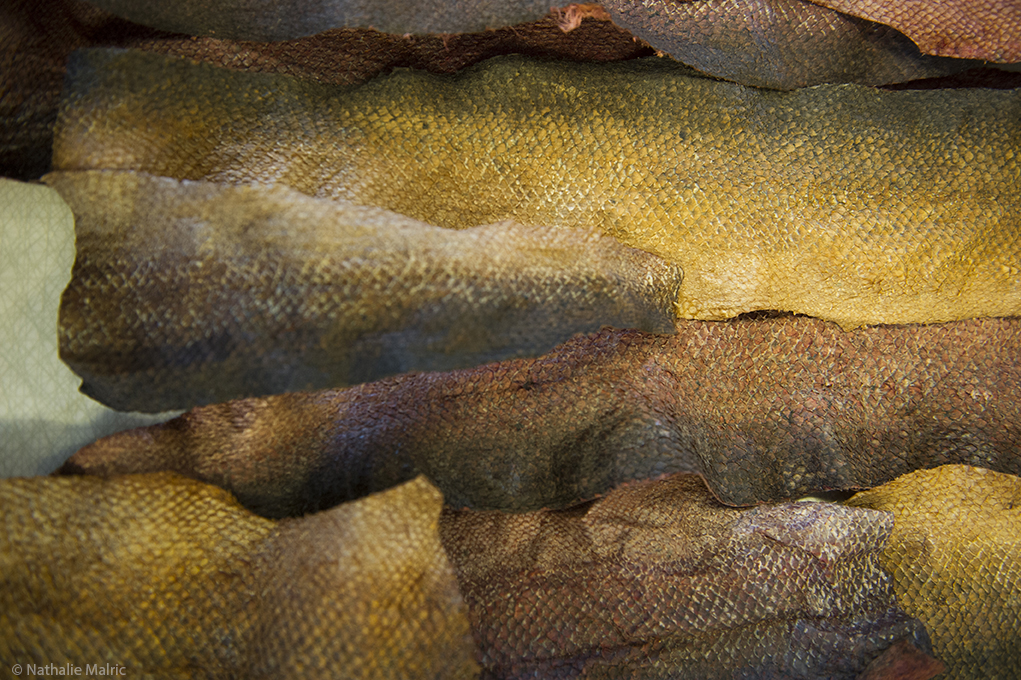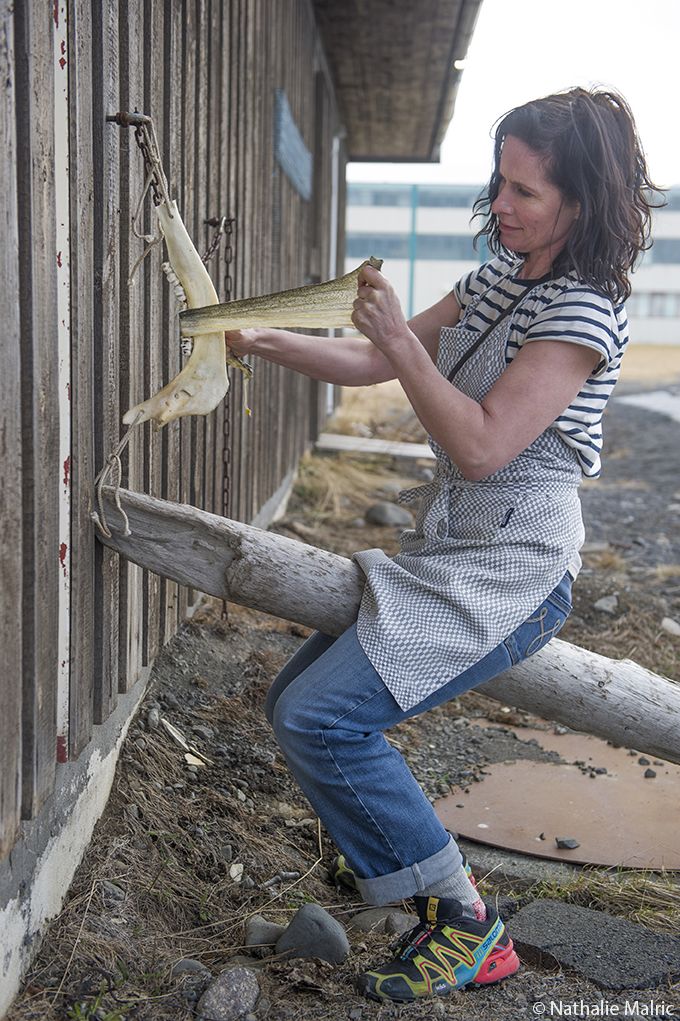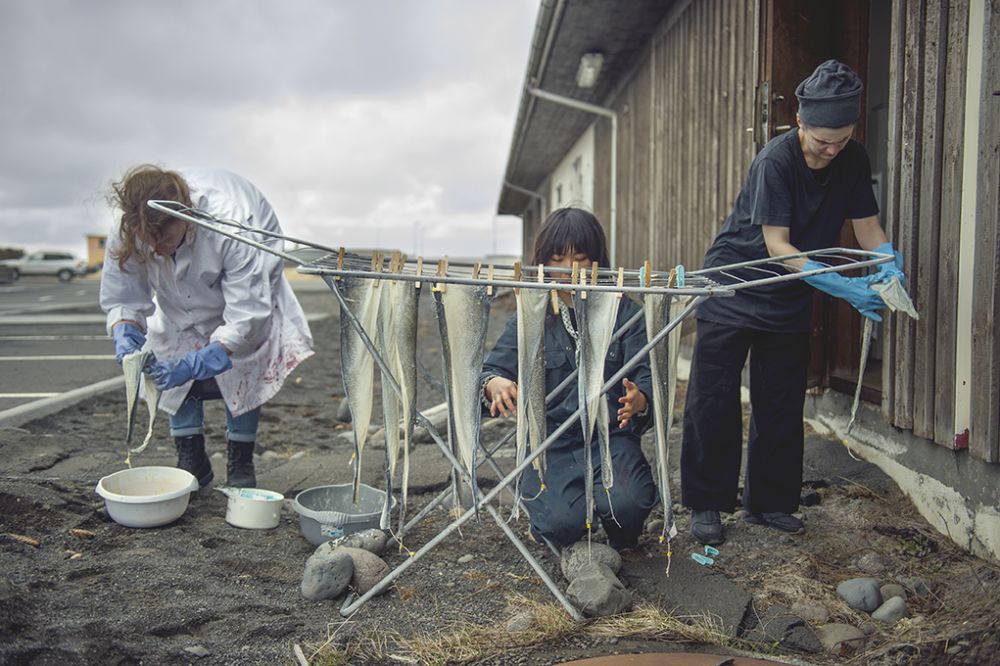LCF PhD student Elisa Palomino received a Fulbright Award to the United States
As a Fulbright Scholar, I will build networks and collaborate with US educational academics and practitioners such Parsons New School of Design to better understand how arctic fish skin craftsmanship can be developed in higher education.
The use of fish skin for the construction of garments and accessories is an ancient tradition in Arctic coastal societies and there is evidence of fish leather production in Scandinavia, Alaska, Japan, northeast China and Siberia.
The research that Elisa Palomino is doing through her PhD studies at London College of Fashion’s Centre for Sustainable Fashion is an interdisciplinary study of indigenous Arctic fish skin heritage, building connections between anthropology, ethnography and environmental protection to address global issues of fashion sustainability and the impact that our human activities are having on the planet.
The use of fish skin by Arctic people has recently been assimilated as an innovative sustainable material for fashion due to their low environmental impact. Fish skins are sourced from the food industry, using waste, applying the principle of circular economy. This research is a material-based exploration linked to socially responsive design innovation and knowledge transfer based on Education for Sustainable Development.
The research investigates the sustainable use of local resources from raw materials to craftsmanship and local knowledge through participatory design practices between fish skin artisans and Fashion HE students. The workshops created by the researcher are case studies where traditional fish skin tanning methods and material samples have been developed. Experienced artisans have passed down the fish skin craft to the next generation of students from universities where traditionally fish skin was developed (Iceland, Denmark, Sweden, Finland, Japan, China and Alaska). The methods of sustainable material engagement and the teaching-in-the field approach are recommended as transferable skills for alternative fashion educational models. The workshops demonstrate how the indigenous fish skin knowledge -in partnership with sustainable design strategies- can connect people to their culture, communities and the environment.
Gallery
The research attempts to describe how the transmission of the Arctic traditional fish skin craft to fashion HE students can contribute to sustainability education in fashion. The research is investigated through the researcher’s current practice as educator under the role of Fashion Print pathway leader at Central Saint Martins, and fashion lecturer at several International Universities supporting fashion design students to engage in sustainability.
This research draws on Elisa Palomino previous industry experience as a fashion designer working in the luxury industry in the design and manufacture of leather goods. While working for John Galliano and Christian Dior, she designed fish leather garments and accessories for the Autumn/Winter 2002 collections made out of salmon, perch and cod skins sourced at Atlantic leather- the world’s biggest fish skin tannery based in Iceland - situating the use of fish leather within the context of the luxury Industry.
Elisa Palomino has received a Fulbright All Disciplines Scholar Award to enable her to undertake research under the mentoring of William Fitzhugh, Director at the Arctic Studies Center at the Smithsonian Institute in Washington and Anchorage on one of the most well-regarded and impactful scholarship programmes in the world.
As a participant, Elisa has been selected to carry out an educational research project to examine Indigenous Arctic Fish skin clothing: Cultural and ecological impacts on Fashion Higher Education, and the learning strategies that are most beneficial for promoting these skills in university students.
This is a wonderful opportunity for me to carry out research with leading academics in the field of Arctic anthropology. This research is an interdisciplinary study of indigenous Arctic fish skin heritage, building connections between anthropology, ethnography and environmental protection taking in consideration global issues of fashion’s sustainability and the impact that our fashion practices are having on the planet. The research looks at how we can learn from fish skin, the use of resources from raw materials and local knowledge applied to fashion through case studies working with fashion HE students and fish skin artisans using participatory practices.
As a Fulbright Scholar, I will build networks and collaborate with US educational academics and practitioners such Parsons New School of Design to better understand how arctic fish skin craftsmanship can be developed in higher education. This work will enable me to disseminate evidence-based learning strategies to teachers, students, and other educators globally through my own applied research role and that of my host, William Fitzhugh.
About the US-UK Fulbright Commission:
The US-UK Fulbright Commission was founded by diplomatic treaty in 1948 to foster intercultural understanding between the USA and the UK through educational exchange. It continues to support Senator Fulbright’s vision through scholarship and summer programmes, enabling British and American citizens to study, research or teach at universities on either side of the Atlantic.
As part of the Education USA network, the Commission offers British students free, accurate, and comprehensive information about opportunities to study at accredited universities in the USA.
The Commission also delivers the Sutton Trust US Programme, designed to help high-achieving, low-income UK students explore US higher education.
About the Awards:
The US-UK Fulbright Commission provides the only bilateral, transatlantic scholarship programme in the UK, offering Awards for study or research in any field, at any accredited US or UK University.
The Commission selects scholars through a rigorous application and interview process, looking for academic excellence alongside a focused application, a range of extracurricular and community activities, demonstrated ambassadorial skills, a desire to further the Fulbright Programme and a plan to give back to the UK upon returning.
Typical grants include a maintenance allowance and/or a contribution towards tuition fees. Fulbright scholars receive administrative support and a cultural education programme including visa processing, a comprehensive pre-departure orientation, enrichment opportunities in the USA, a re-entry session and access to a global alumni network.




